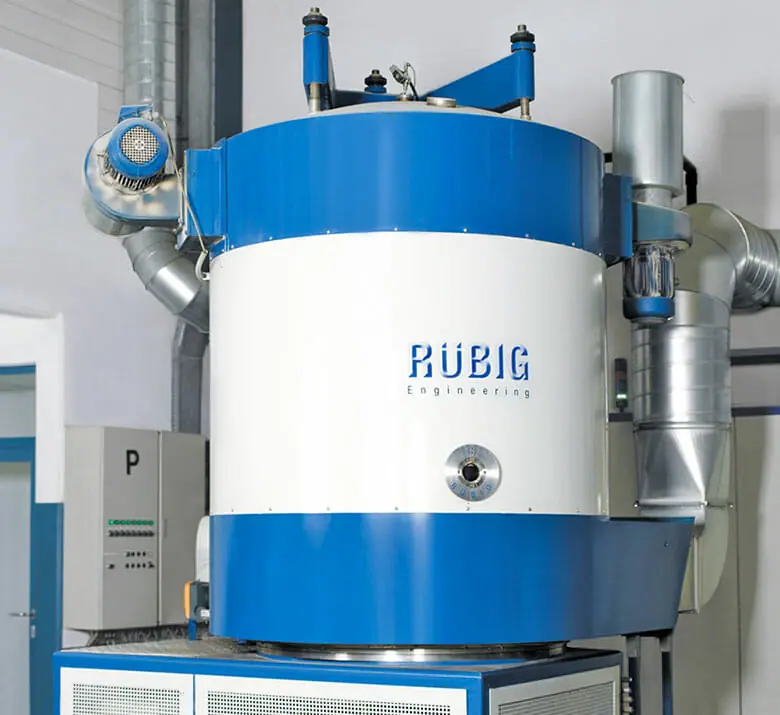Micropulse Plasma Nitriding
With plasma nitriding, the edge of a workpiece is either finished with nitrogen or with nitrogen and carbon (plasma nitrocarburising) in an ionised gas atmosphere. To improve the tribological characteristics of the component, it can then be oxidised.
Advantages
- High level of resistance to wear and tear
- Minimal distortion
- Partial nitriding
- Reduction in coefficient of friction
Materials
- Low-alloy steels
- Tool steels
- Nitriding steels
- Stainless steels
Available plant sizes
- Length 1.200 mm, diameter 1.000 mm

Typical values for plasma nitriding
Which materials can be plasma nitrided? What hardness and nitriding depth can be achieved? Here you will find an overview of typical hardness values of different material groups:
| DIN EN 10027-2 Material number | DIN EN 10027-2 (Short) designation | Surface Hardness in Vickers [HV0,5] | max. Nitriding hardness depth (NHD) [mm] |
|---|---|---|---|
| Carbon steel | |||
| 1.0060 | E335 | 280-500 | 0,6 |
| 1.0577 | S355 | 280-480 | 0,6 |
| 1.1191 | C 45 E | 300-500 | 0,7 |
| 1.1221 | C 60 E | 300-500 | 0,7 |
| 1.5122 | 37MnSi5 | 300-500 | 0,6 |
| Tempered steel | |||
| 1.0762 | 44SMn28 (ETG 100) | 400-500 | 0,3 |
| 1.7033 | 34Cr4 | 500-600 | 0,5 |
| 1.7220 | 34CrMo4 | 500-600 | 0,5 |
| 1.7225 / 1.7227 | 42CrMo4 / 42CrMoS4 | 550-700 | 0,5 |
| 1.8159 | 50CrV4 | 550-700 | 0,5 |
| 1.8161 | 58CrV4 | 550-700 | 0,5 |
| 1.6582 | 34CrNiMo6 | 600-800 | 0,5 |
| 1.2710 | 45NiCr6 | 600-750 | 0,4 |
| 1.2312 | 40CrMnMoS86 | 650-800 | 0,3 |
| Case-hardening steel | |||
| 1.7131 / 1.7139 | 16MnCr5 / 16MnCrS5 | 600-750 | 0,5 |
| 1.7147 | 20MnCr5 | 600-650 | 0,4 |
| 1.5752 | 14NiCr14 | 500-650 | 0,4 |
| Nitriding steel | |||
| 1.8504 | 34CrAl6 | 900-1200 | 0,4 |
| 1.8507 | 34CrAlMo5 | 900-1300 | 0,5 |
| 1.8519 | 31CrMoV9 | 780-900 | 0,5 |
| 1.8550 | 34CrAlNi7 | 900-1100 | 0,5 |
| Ball bearing steel | |||
| 1.3505 | 100Cr6 | 450-700 | 0,25 |
| 1.2510 | 100MnCrW4 | 500-700 | 0,25 |
| Grey cast iron — nodular cast iron | |||
| 0.6025 | EN-GJL-250 (GG 25) | 300-450 | 0,3 |
| 0.7080 | EN-GJS-600 (GGG 60) | 450-600 | 0,4 |
| Stainless steel | |||
| 1.4006 | X10Cr13 | 900-1100 | 0,1 |
| 1.4021 | X20Cr13 | 900-1200 | 0,1 |
| 1.4034 | X40Cr13 | 900-1200 | 0,1 |
| 1.4122 | X35CrBo17 | 1000-1250 | 0,15 |
| 1.4571 | X10CrNiMoTi1712-2 | 900-1150 | 0,1 |
| Cold work steel | |||
| 1.2379 | X155CrMoV121 | 900-1200 | 0,15 |
| 1.2080 | X210Cr12 | 850-1150 | 0,15 |
| 1.2364 | X100CrMoV51 | 1000-1200 | 0,2 |
| 1.2601 | X165CrMoV12 | 900-1150 | 0,15 |
| 1.2436 | X210CrV12 | 700-900 | 0,15 |
| Hot work steel | |||
| 1.2343 | X38CrMoV51 | 900-1150 | 0,4 |
| 1.2344 | X40CrMoV51 | 900-1150 | 0,4 |
| 1.2567 | X30WCrV53 | 850-1050 | 0,3 |
| 1.2365 | X32CrMoV33 | 750-900 | 0,3 |
| High Speed Steel (HSS) | |||
| All qualities | 950-1400 | 0,02-0,15 | |
The maximum hardness is determined by the material. All statements without guarantee.
Downloads
Want to read up a bit? Need details? No problem, simply download the information you need.
